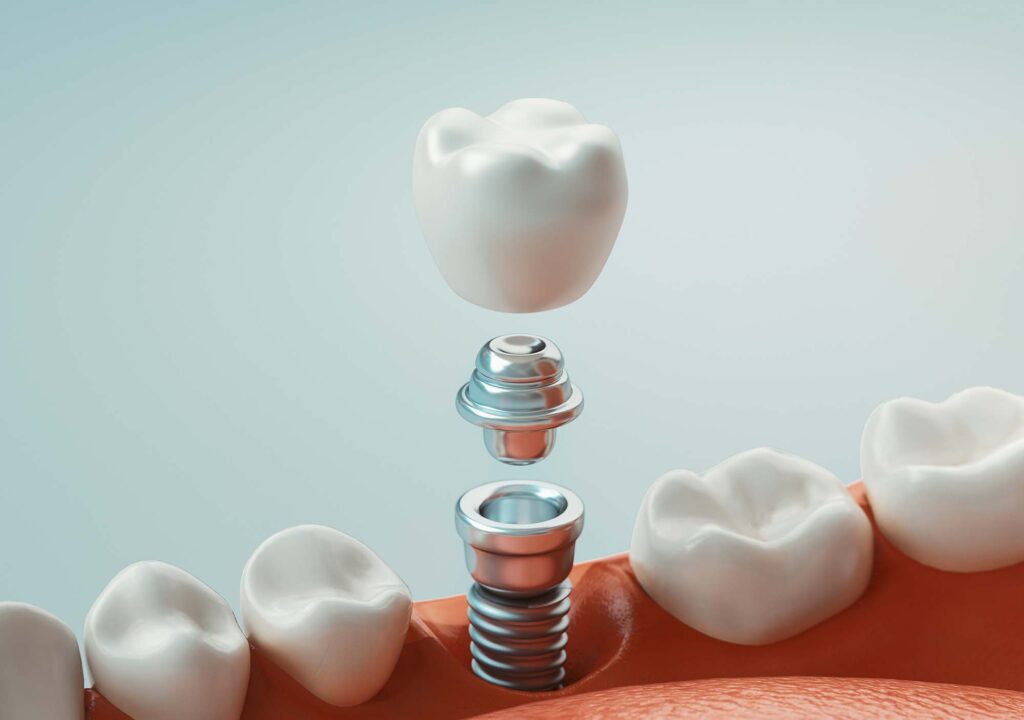
Getting dental implants is far less painful than most people expect. During the actual procedure, you won’t feel pain because of local anesthesia, though you may notice some pressure. Most patients report that dental implant discomfort is comparable to a simple tooth extraction. Post-operative pain is typically manageable with over-the-counter medication and subsides within a few days. Understanding what to expect at each stage helps ease anxiety about dental implant procedure pain.
What does getting a dental implant actually feel like during the procedure?
You won’t experience pain during dental implant placement because we use local anesthesia to completely numb the treatment area. What you will feel is pressure and vibration as the implant post is positioned into your jawbone. Many patients describe the sensation as similar to having a tooth extracted, minus any sharp or painful feelings.
The difference between anticipation and reality surprises most patients. The anxiety about dental implant pain is often worse than the actual experience. We ensure you’re thoroughly numbed before beginning, and you can communicate at any point if you feel discomfort. For patients with dental anxiety, we offer sedation options including oral sedation, nitrous oxide, and IV sedation to help you feel completely relaxed throughout the procedure.
The procedure itself involves careful, controlled movements. You’ll hear sounds and feel movement, but the anesthesia for dental implants keeps you comfortable. Most patients find the experience much easier than they imagined, especially when they understand that pressure doesn’t equal pain.
How much pain should you expect after dental implant surgery?
Dental implant recovery pain peaks within the first 24 to 72 hours after surgery, then gradually improves. Most patients describe the discomfort as a dull ache or soreness at the implant site, similar to the feeling after having a tooth removed. This pain after dental implant surgery is typically well-controlled with prescribed or over-the-counter pain medication.
Compared to other dental procedures, dental implants often cause less discomfort than people expect. The pain level is generally comparable to a standard tooth extraction and usually less intense than root canal recovery. By the end of the first week, most patients report minimal discomfort and can return to normal activities.
The healing timeline follows a predictable pattern. Days one through three involve the most noticeable soreness, along with possible mild swelling. Days four through seven show significant improvement, with many patients only needing occasional pain relief. After two weeks, most discomfort has resolved, though complete healing of the bone around the implant takes several months. If you experience severe, worsening pain or pain that doesn’t respond to medication, contact us immediately, as these could indicate complications requiring attention.
What pain management options are available for dental implants?
Comprehensive dental implant pain management begins before your procedure and continues through recovery. During surgery, local anesthesia numbs the treatment area completely. We also offer sedation dentistry options for anxious patients, including oral sedation for relaxation, nitrous oxide for mild anxiety relief, and IV sedation for deeper relaxation during longer procedures.
After your procedure, we’ll provide specific pain management guidance tailored to your situation. Most patients manage discomfort effectively with ibuprofen or prescribed pain medication for the first few days. We recommend taking pain medication before the anesthesia wears off to stay ahead of discomfort rather than waiting until pain develops.
Home care strategies significantly reduce dental implant discomfort. Apply ice packs to the outside of your face for 20 minutes on, 20 minutes off during the first 24 hours to minimize swelling and numb the area. Stick to soft, cool foods like yogurt, smoothies, and mashed potatoes for the first few days. Avoid hot foods, crunchy textures, and chewing on the implant side. Rest is essential, so avoid strenuous exercise and activities that could increase blood pressure and cause additional swelling or bleeding. Keeping your head elevated, even while sleeping, also helps reduce swelling and associated discomfort.
Why do some people experience more dental implant pain than others?
Individual pain experiences with dental implants vary based on several factors. The number of implants placed affects recovery, single implants typically cause less discomfort than multiple implants placed in one session. Bone grafting procedures, sometimes necessary to create adequate bone support, add to the complexity and can increase post-operative soreness.
Your personal characteristics play a significant role in how painful dental implants feel to you. Pain tolerance varies naturally from person to person. Some patients barely notice discomfort, while others are more sensitive to post-surgical soreness. Pre-existing conditions like gum disease or infections in the treatment area can increase inflammation and discomfort during healing.
The surgical technique and your commitment to post-operative care also influence your experience. Experienced practitioners like Dr. Sugg use precise, minimally invasive techniques that reduce tissue trauma and speed healing. Following post-operative instructions carefully makes a substantial difference. Patients who rest appropriately, take medications as directed, maintain gentle oral hygiene, and avoid disturbing the surgical site typically experience smoother, less painful recoveries. Understanding these factors helps you set realistic expectations and take steps to minimize dental implant discomfort based on your unique situation.
If you’re considering dental implants but concerned about pain, we’re here to address your specific questions and create a personalized comfort plan. Our experience with thousands of successful implant placements means we understand how to make your procedure as comfortable as possible. Request an Appointment to learn more about what to expect and how we’ll ensure your experience is positive from start to finish.
